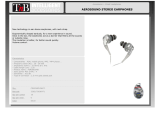
7
LR-500 Specications
Architectural Specications
The FM receiver shall be capable of receiving on 32 channels. The receiver shall have a SNR of 80 dB
or greater. The receiver shall be programmable to electronically lock out unneeded channels. The
receiver shall be capable of seeking channels locked on an active channel. The device shall have a
squelch. The unit shall have an audio frequency response of 50 Hz to 15 kHz (±3 dB). The device shall
incorporate a stereo headset jack that allows the user to plug in either a mono or stereo headset
and listen to audio normally. The device shall incorporate an LCD display. The receiver shall
incorporate automatic battery charging circuitry. The device shall be able to use of two (2) alkaline
or NiMH batteries. The Listen LR-500-150 is specied.
Specications*
Audio
RF Frequency Range 150.8000 MHz - 152.3500 MHz
Number of Channels 6 wide band, 26 narrow band
Sensitivity .6uV typical, 1 uV maximum for 12 dB sinad
Frequency Accuracy ± .005% stability 32 to 122 ºF (0 to 50 ºC)
Antenna Uses earphone cable
Squelch Programmable in 20 steps, automatic on loss of RF signal
System Frequency
Response
50 Hz - 15 kHz (±3 dB)
System Signal to Noise Ratio SQ enabled 80 dB, SQ disabled 60 dB
System Distortion <2% total harmonic distortion (THD) at 80% deviation
Output 3.5 mm (0.14 in.) connectors, unbalanced, 0 dBu nominal output level,
16 mW maximum, impedance 32 ohm
Controls &
Indicators
User Controls Channel up/down, SEEK, volume
Set-up Controls
(Battery Compartment)
Alkaline/NiMH batteries, SQ enable/disable
Programming Channel lock, squelch, channel lock out
LED Red, illuminated when unit is on, ashes when batteries are low or to indicate charging,
ashes when locked and SEEK is pushed
Display Channel designation,battery level, battery charging,
RF signal strength, programming and channel lock
Power
Battery Type Two (2) AA batteries, alkaline or NiMH
Battery Life (Listen Batteries) 30 hours alkaline (LA-361), 15 hours NiMH rechargeable (LA-362)
Battery Charging (NiMH only) Fully automatic, 13 hours
Power Supply I/P 120 VAC; O/P 7.5 VDC 250 mA, drop in contact points for use with charging cases,
power supply not included (LA-208)
Power Supply Connector 0.09 in. (2.3 mm) OD by 0.7 mm ID, barrel type connector 7.5 VDC, center positive <250 mA,
drop in contact points for use with Listen charging cases
Power Supply Compliance RoHS, WEEE, UL, PSE, CE, CUL, TUV, CB
Physical
Dimensions (H x W x D)
4.25 x 2.75 x 1.50 in. (10.8 x 7.0 x 3.8 cm)
Color
Dark Grey with white silk screening
Unit Weight
3.9 oz (111 g)
Unit Weight with batteries
5.8 oz (164 g)
Shipping Weight
6.1 oz (173 g)
Door
Manually Lockable (on sides). Up, down, and power buttons through door.
Environmental
Temperature-Operation
14 to 104 ºF (-10 to 40 ºC)
Temperature-Storage
(-)4 to 122 °F (-20 to 50 °C)
Humidity
0 to 95% relative humidity, non-condensing
*Specications are subject to change without notication




















